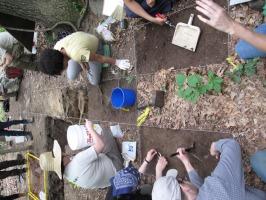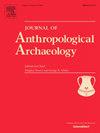考古学的认识论广度:历史视角下的协作-本土与本体论转向
IF 2.2
1区 社会学
Q1 ANTHROPOLOGY
引用次数: 0
摘要
本文考虑了当代考古学中两种寻求增加考古学认识论广度的土著取向方法:合作土著考古学和本体论转向。一种更实用,另一种更理论化,这些方法很少被放在一起考虑。每个人都试图在考古学和土著人民、政治和/或观点之间建立新的联系。这些联系增加了对本土知识的关注,同时识别并纠正了支撑该学科的武断的现代主义价值观。尽管它们优先考虑相似的目标,但这些方法采用的路径却截然不同。通过将它们置于历史背景中,并强调与先前人类学和考古学研究的差异或“差异性”的联系,本文强调了这些方法之间的重要相似性和差异性。通过与相对主义和女权主义转向的历史对比,这种比较显示了新实践者和新理论如何帮助扩展考古学的认识论广度之间的重要区别。本文章由计算机程序翻译,如有差异,请以英文原文为准。

Archaeology’s epistemological breadth: Collaborative-Indigenous and ontological turns in historical perspective
This paper considers two Indigenous-oriented approaches in contemporary archaeology that seek to increase archaeology’s epistemological breadth: collaborative Indigenous archaeology and the ontological turn. One more practical, the other more theoretical, these approaches are rarely considered together. Each seeks to build new connections between archaeology and Indigenous peoples, politics, and/or perspectives. These connections increase focus on Indigenous knowledges while identifying—and correcting for—the arbitrary modernist values that undergird the discipline. Although they prioritize similar goals, these approaches take very different paths. By placing them into historical context and highlighting connections to previous anthropological and archaeological engagements with difference or “alterity,” this paper emphasizes important similarities and differences between these approaches. Drawing historical parallels with relativist and feminist turns, this comparison shows important distinctions between how new practitioners and new theories help to expand archaeology’s epistemological breadth.
求助全文
通过发布文献求助,成功后即可免费获取论文全文。
去求助
来源期刊

Journal of Anthropological Archaeology
Multiple-
CiteScore
4.00
自引率
11.10%
发文量
64
期刊介绍:
An innovative, international publication, the Journal of Anthropological Archaeology is devoted to the development of theory and, in a broad sense, methodology for the systematic and rigorous understanding of the organization, operation, and evolution of human societies. The discipline served by the journal is characterized by its goals and approach, not by geographical or temporal bounds. The data utilized or treated range from the earliest archaeological evidence for the emergence of human culture to historically documented societies and the contemporary observations of the ethnographer, ethnoarchaeologist, sociologist, or geographer. These subjects appear in the journal as examples of cultural organization, operation, and evolution, not as specific historical phenomena.
 求助内容:
求助内容: 应助结果提醒方式:
应助结果提醒方式:


